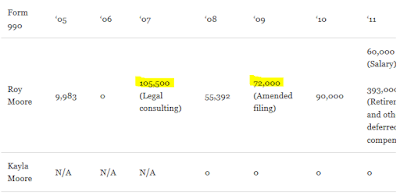Turns out there's a version of that technique in PolitiFact's fact-checking tool box.
Nixon was Never Impeached
Back on June 13th, 2019 PolitiFact's PunditFact declared it "False" that Nixon was impeached. PunditFact said "Nixon was never officially impeached." We're not sure what would count as "unofficially impeached." We're pretty sure it's the same as saying Nixon was not impeached.But that was way back in June. Over three months have passed. And it's now sufficiently true that Nixon was impeached so that PolitiFact can spread the idea on Twitter and write an impeachment PolitiSplainer that refers multiple times to the Nixon impeachment.
Nixon was Impeached
TwitterEdit: (if embed isn't working use hotlink above)Johnson, Nixon, Clinton, Trump: We answer nine questions about impeachment. https://t.co/fzgdYA0iqE pic.twitter.com/MLh6cODpuN— PolitiFact (@PolitiFact) October 12, 2019
Is Nixon a good example to include with Johnson and Clinton (let alone Trump) if Nixon wasn't impeached?
More than anything, the procedural details are derived from historical precedent, from the impeachment of President Andrew Johnson in the 1860s to that of President Richard Nixon in the 1970s and President Bill Clinton in the 1990s.
Got it? The impeachment of President Nixon. Because Nixon was impeached, right?
Experts pointed to a variety of differences between the Trump impeachment process and those that went before.Got it? Nixon was impeached over the Watergate burglary. Because Nixon was impeached, right?
The differences begin with the substance of the charges. All prior presidential impeachments have concerned domestic issues — the aftermath of the Civil War in Johnson’s case, the Watergate burglary and coverup under Nixon, and the Monica Lewinsky affair for Clinton.
The impeachments of both Nixon and Clinton did tend to curb legislative action by soaking up all the attention in Washington, historians say.Obviously a fact-checker will not refer to "the impeachments of both Nixon and Clinton" if Nixon was not impeached. Therefore, Nixon was impeached. Right?
Some congressional Republicans have openly supported Trump’s assertion that the allegations against Trump are dubious. This contrasts with the Nixon impeachment, when "on both sides there was a pretty universal acknowledgement that the charges being investigated were very important and that it was necessary to get to the bottom of what happened," said Frank O. Bowman III, a University of Missouri law professor and author of the book, "High Crimes and Misdemeanors: A History of Impeachment for the Age of Trump."Obviously a fact-checker will only draw a parallel to the Nixon impeachment if Nixon was impeached. Therefore Nixon was impeached. Right?
Trump is facing possible impeachment about a year before running for reelection. By contrast, both Nixon and Clinton had already won second terms when they were impeached. (Johnson was such an outcast within his own party that he would have been an extreme longshot to win renomination, historians say.)Got it? Nixon and Clinton had already won second terms when they were impeached. Because Nixon was impeached, right?
On the eve of impeachment for both Nixon and Clinton, popular support for impeachment was weak — 38% for Nixon and 29% for Clinton, according to a recent Axios analysis. (There was no public opinion polling when Johnson was president.)Got it? "On the eve of impeachment for both Nixon and Clinton," because a fact checker doesn't refer to the eve of the Nixon impeachment if there was no Nixon impeachment.
Is there a Christmas Eve if there's no Christmas?
That's six times PolitiFact referred to the Nixon impeachment in just one PolitiSplainer article. And about three months after PolitiFact's PunditFact said Nixon was not impeached.
Want a seventh? We've got a seventh:
During Nixon’s impeachment, "people counted on the media to serve as arbiters of truth," he said. "Obviously, we don’t have that now.""During Nixon's impeachment" directly implies Nixon was impeached. Seven.
We've been going in order, too.
(Nixon Wasn't Impeached)
But behold! Context at last!
The uncertainty about Senate process stems from the rarity of the process. Nixon resigned before the House could vote to send articles to the Senate, leaving just one precedent -- Clinton’s trial — in the past century and a half.Admittedly, that's not PolitiFact saying "Nixon was not impeached." On the other hand, it's PolitiFact directly implying Nixon was not impeached. Blink and you might miss it amidst all the talk about the Nixon impeachment.
Can we get to eight after that bothersome bit of context?
Nixon was Impeached, Continued
We can:The impeachments of both Nixon and Clinton did tend to curb legislative action by soaking up all the attention in Washington, historians say.We're curious which historians PolitiFact talked to who explicitly referred to the impeachment of Nixon. There are no quotations in the text of the PolitiSplainer that would support this claim about what historians say.
PolitiFact flirted with nine in the next paragraph. We're capping the count at eight.
In summary, we'll just say this: If there's a sense of "impeachment" that doesn't mean literally getting impeached by Congress and standing trial in the Senate, then Jimmy Kimmel is entitled to that understanding when he says Nixon was the last president to be impeached.
Contrary to PolitiFact's framing, Kimmel was wrong not because Nixon was not impeached. Kimmel was wrong because President William J. Clinton was the last president to be impeached. There was never any need for PunditFact to focus on the fact Nixon wasn't impeached, unless it was to avoid emphasis on Clinton.
This all works out very well for PolitiFact. PolitiFact does what it can to spread the misperception Nixon was impeached. And then it can draw clicks to its PunditFact fact check showing that claim false.
Just like dropping roofing nails on the road.












